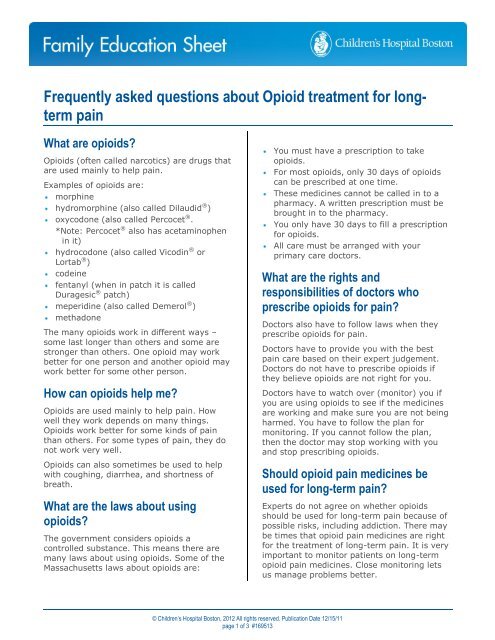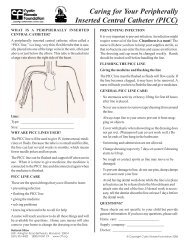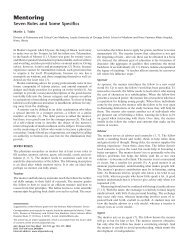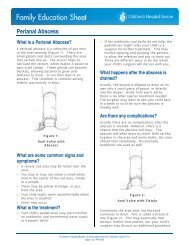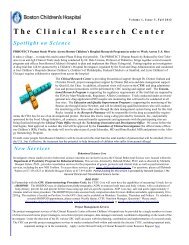Frequently asked questions about Opioid treatment for longterm
Frequently asked questions about Opioid treatment for longterm
Frequently asked questions about Opioid treatment for longterm
Create successful ePaper yourself
Turn your PDF publications into a flip-book with our unique Google optimized e-Paper software.
<strong>Frequently</strong> <strong>asked</strong> <strong>questions</strong> <strong>about</strong> <strong>Opioid</strong> <strong>treatment</strong> <strong>for</strong> <strong>longterm</strong><br />
pain<br />
What are opioids?<br />
<strong>Opioid</strong>s (often called narcotics) are drugs that<br />
are used mainly to help pain.<br />
Examples of opioids are:<br />
morphine<br />
hydromorphine (also called Dilaudid ® )<br />
oxycodone (also called Percocet ® .<br />
*Note: Percocet ® also has acetaminophen<br />
in it)<br />
hydrocodone (also called Vicodin ® or<br />
Lortab ® )<br />
codeine<br />
fentanyl (when in patch it is called<br />
Duragesic ® patch)<br />
meperidine (also called Demerol ® )<br />
methadone<br />
The many opioids work in different ways –<br />
some last longer than others and some are<br />
stronger than others. One opioid may work<br />
better <strong>for</strong> one person and another opioid may<br />
work better <strong>for</strong> some other person.<br />
How can opioids help me?<br />
<strong>Opioid</strong>s are used mainly to help pain. How<br />
well they work depends on many things.<br />
<strong>Opioid</strong>s work better <strong>for</strong> some kinds of pain<br />
than others. For some types of pain, they do<br />
not work very well.<br />
<strong>Opioid</strong>s can also sometimes be used to help<br />
with coughing, diarrhea, and shortness of<br />
breath.<br />
What are the laws <strong>about</strong> using<br />
opioids?<br />
The government considers opioids a<br />
controlled substance. This means there are<br />
many laws <strong>about</strong> using opioids. Some of the<br />
Massachusetts laws <strong>about</strong> opioids are:<br />
© Children’s Hospital Boston, 2012 All rights reserved. Publication Date 12/15/11<br />
page 1 of 3 #169513<br />
You must have a prescription to take<br />
opioids.<br />
For most opioids, only 30 days of opioids<br />
can be prescribed at one time.<br />
These medicines cannot be called in to a<br />
pharmacy. A written prescription must be<br />
brought in to the pharmacy.<br />
You only have 30 days to fill a prescription<br />
<strong>for</strong> opioids.<br />
All care must be arranged with your<br />
primary care doctors.<br />
What are the rights and<br />
responsibilities of doctors who<br />
prescribe opioids <strong>for</strong> pain?<br />
Doctors also have to follow laws when they<br />
prescribe opioids <strong>for</strong> pain.<br />
Doctors have to provide you with the best<br />
pain care based on their expert judgement.<br />
Doctors do not have to prescribe opioids if<br />
they believe opioids are not right <strong>for</strong> you.<br />
Doctors have to watch over (monitor) you if<br />
you are using opioids to see if the medicines<br />
are working and make sure you are not being<br />
harmed. You have to follow the plan <strong>for</strong><br />
monitoring. If you cannot follow the plan,<br />
then the doctor may stop working with you<br />
and stop prescribing opioids.<br />
Should opioid pain medicines be<br />
used <strong>for</strong> long-term pain?<br />
Experts do not agree on whether opioids<br />
should be used <strong>for</strong> long-term pain because of<br />
possible risks, including addiction. There may<br />
be times that opioid pain medicines are right<br />
<strong>for</strong> the <strong>treatment</strong> of long-term pain. It is very<br />
important to monitor patients on long-term<br />
opioid pain medicines. Close monitoring lets<br />
us manage problems better.
Family Education Sheet • <strong>Frequently</strong> <strong>asked</strong> <strong>questions</strong> <strong>about</strong> <strong>Opioid</strong><br />
<strong>treatment</strong> <strong>for</strong> long-term pain<br />
How do we monitor patients who<br />
take opioids?<br />
Some side effects, such as nausea and<br />
itching, can be checked by asking if you are<br />
having these problems. Other side effects<br />
need to be monitored by asking your parents<br />
or someone else to help. We check <strong>for</strong> side<br />
effects such as changes in behavior, mood,<br />
attention, reaction time, school work, and<br />
your ability to care <strong>for</strong> yourself. Doctors will<br />
work with you to come up with the best plan<br />
<strong>for</strong> monitoring these side effects. If you aren’t<br />
able to follow the plan, taking long-term<br />
opioids may not be the right choice <strong>for</strong> you.<br />
What are the side effects of taking<br />
opioids?<br />
Some side effects only happen <strong>for</strong> a short<br />
time and go away with long-term use:<br />
nausea (upset belly) or throwing up<br />
sweating<br />
dizziness (whirling feeling)<br />
sleepiness<br />
slow breathing<br />
itchiness<br />
headache<br />
<strong>for</strong>getfulness<br />
trouble concentrating<br />
slow reaction times<br />
constipation (cannot poop)<br />
hormone changes<br />
moodiness<br />
lower sexual desire<br />
Some side effects may continue to happen no<br />
matter how long you take opioids (such as<br />
constipation, hormone changes, changes in<br />
behavior, and physical dependence).<br />
Hormone changes<br />
<strong>Opioid</strong>s may lower the levels of some<br />
hormones. This can change some ways that<br />
the body works, including how you feel <strong>about</strong><br />
sex.<br />
Women: Tell your doctor if you are taking<br />
opioid pain medicines, especially if you are<br />
pregnant or plan on getting pregnant. If you<br />
© Children’s Hospital Boston, 2012 All rights reserved. Publication Date 12/15/11<br />
page 2 of 3 #169513<br />
have a baby while taking these medicines,<br />
your baby will be physically dependent on<br />
opioids. Taking opioids is not linked to a risk<br />
of birth defects.<br />
Men: Long-term opioid use may lead to low<br />
levels of testosterone, the male sex hormone.<br />
This could affect your mood, stamina (ability<br />
to keep up), desire <strong>for</strong> sex, and physical and<br />
sexual per<strong>for</strong>mances.<br />
Working & Driving<br />
<strong>Opioid</strong> pain medicines can cause some side<br />
effects (such as sleepiness) that can affect<br />
working and driving. These side effects are<br />
common when you first start the medicine or<br />
when you increase the dose. You should talk<br />
to your doctor <strong>about</strong> your job and if it is safe<br />
<strong>for</strong> you to work while taking opioids.<br />
If you are taking opioids and want to get a<br />
driver’s license, you will need extra tests (i.e.<br />
to test your reaction time) be<strong>for</strong>e you can<br />
start the driver’s license application.<br />
Alcohol<br />
You should not drink any alcohol (beer, wine<br />
or hard liquor) while taking opioids. When<br />
mixed with alcohol, the effect of these<br />
medicines can be stronger. Sometimes this<br />
can lead to a lower level of awareness and<br />
slow or even stopped breathing.<br />
Do opioids used as pain medicines<br />
cause addiction?<br />
Addiction is a problem where a person<br />
cannot stop using a drug even though the<br />
drug is harmful. An example would be a<br />
patient who is using opioids <strong>for</strong> mood effects,<br />
rather than <strong>for</strong> pain relief.<br />
It is not common <strong>for</strong> people to become<br />
addicted when taking opioids <strong>for</strong> short-term<br />
pain from burns, wounds, and operations.<br />
However, people who have a history of<br />
addiction or mood disorders may be at risk<br />
<strong>for</strong> addiction to opioids.<br />
The risks of long-term opioid use are not well<br />
known. Long-term opioid use <strong>for</strong> pain relief<br />
has not been studied except in patients with<br />
cancer. Many patients with cancer have safely<br />
used opioids <strong>for</strong> long-term pain relief.
Family Education Sheet • <strong>Frequently</strong> <strong>asked</strong> <strong>questions</strong> <strong>about</strong> <strong>Opioid</strong><br />
<strong>treatment</strong> <strong>for</strong> long-term pain<br />
What will happen if I suddenly stop<br />
taking my opioid pain medicines?<br />
Physical dependence happens if you take<br />
certain drugs, including opioids, <strong>for</strong> a long<br />
time (more than 2 weeks). If you suddently<br />
stop taking these drugs you will have<br />
withdrawal symptoms. Symptoms include<br />
shaking, anxiety, grouchiness, trouble<br />
sleeping, stomach cramps, diarrhea, pain,<br />
hallucinations and sometimes seizures.<br />
Withdrawal from opioids can be very<br />
unpleasant, but it is not usually dangerous.<br />
In most situations, we do not suggest<br />
stopping opioids suddenly. If you wish to stop<br />
taking opioids, you should slowly lower the<br />
amount you take over time.<br />
© Children’s Hospital Boston, 2012 All rights reserved. Publication Date 12/15/11<br />
page 3 of 3 #169513<br />
Will opioids eventually stop working<br />
as pain medicines <strong>for</strong> me?<br />
Many patients taking opioids <strong>for</strong> a long time<br />
will develop tolerance. This means the pain<br />
medicine becomes less helpful over time. In<br />
some cases, if the dose is raised the medicine<br />
will work well again <strong>for</strong> a long time. In other<br />
cases, the dose can never be high enough to<br />
give good pain relief. Not all patients will<br />
become tolerant and their dose will work well<br />
<strong>for</strong> them as long as it is needed.<br />
A Spanish version of this education sheet is<br />
available from your provider.


